For the United States to lose confidence in its own ability to protect democracy abroad would be to hand Trump and Trumpism a victory when he is on the verge of defeat. It is precisely because American democracy is under pressure at home that the U.S. government ought to stand up for it overseas, argues Thomas Wright. This piece originally appeared in The Atlantic.
Wednesday’s insurrection laid bare the fragility of democracy in the United States. It is unsurprising that many Americans feel their confidence in the country’s democratic ideals deeply shaken. The expressions of concern from American allies, and the schadenfreude from autocrats, including Turkey’s Recep Tayyip Erdoğan, are sobering.
Writing in Foreign Policy, Emma Ashford, a senior fellow at the Atlantic Council, argued, “Ambitious foreign-policy goals are completely out of step with the realities of the country’s domestic political and economic dysfunction … How can the United States spread democracy or act as an example for others if it barely has a functioning democracy at home?” In Foreign Affairs, James Goldgeier, a professor at American University, and Bruce Jentleson, a professor at Duke University, called on President-elect Joe Biden to abandon his proposed international summit for democracy and hold a domestic one instead. Richard Haass, the president of the Council on Foreign Relations, lamented on Twitter that “it will be a long time before we can credibly advocate for the rule of law” overseas.
However, it would be wrong to conclude that our current humiliation means that the United States has somehow lost its standing to speak up for democracy and human rights globally, or that these ideals are less pressing because of our domestic troubles. Quite the opposite. Our situation shows that the United States has a real stake in the struggle.
Repairing democracy at home is not incompatible with standing up for democracy abroad; they are mutually reinforcing. The threats to democracy are not unique to the United States. Trumpism is part of a global nationalist-populist movement that benefits from international networks of kleptocracy, disinformation, and corruption. As Bernie Sanders and Elizabeth Warren noted during the Democratic presidential primary, taking down these networks is a necessary prerequisite for restoring democracy and the rule of law at home.
Many of the long-term threats to democracy—disinformation and the lack of an objective truth, political interference by China and Russia, inequities in the global economy, and fears about interdependence and globalization—can only be addressed collectively. And American allies still want the country’s help. Allied officials have told me in recent days that although they are worried about what’s happening in the United States, they would regard it as a “disaster” if the U.S. abandoned its leadership role in strengthening liberal democracy globally.
This week, Twitter was awash with people arguing that the United States has no moral authority to lecture others about human rights given what happened in Washington. This sentiment was also prevalent over the summer, following the murder of George Floyd. Then, Tamara Cofman Wittes, a former Obama-administration official, wisely observed, in an article on the Brookings Institution website:
To insist that we must first “get our house in order” before speaking to others’ oppression, to be so ashamed by our own shortcomings that we refrain from calling out abuses abroad, and thus to withhold our solidarity from the abused, would itself be an act of moral abdication.
After four years of Donald Trump and rising authoritarianism around the world, we now live in what former U.K. Foreign Secretary David Miliband has labeled the “age of impunity,” when governments believe that they can get away with anything, largely because they can. If the United States does not push back against this, it will only get worse.
In the days after the insurrection, the Chinese embassy in Washington tweeted a horribly offensive statement about the forced sterilization of Uighur women in Xinjiang, China, that was later taken down by Twitter. The post could be interpreted as a deliberate provocation to show that, as the United States fell into crisis, China could push the boundaries of acceptable discourse. Earlier in the week, China arrested scores of prodemocracy activists in Hong Kong in its efforts to slowly strangle the last remnants of freedom in the city.
Perhaps denunciation of these actions and a renewed focus in Congress on how to respond would sound hollow because of America’s domestic problems, but that does not make them any less necessary. Beijing may argue that the United States lacks credibility, but its victims certainly would not.
Unlike the Trump administration, the Biden team has signaled that it is willing to get tough with American allies and other countries when they commit human-rights abuses or undermine democracy—including the Saudi Arabian government’s murder of the journalist Jamal Khashoggi and the imprisonment of women-right’s activists. Many domestic critics of U.S. foreign policy have long argued for these actions. Because America elected—and then rejected—a populist who incites violence, it would be a very unfortunate irony if his newly elected replacement would shy away from holding to account an absolute monarchy that sends teams abroad to kidnap and sometimes murder its critics.
Moments of crisis and despair should force us to confront our own failings and reconcile them with our values and purpose. Sometimes, an individual can articulate that in a way that resonates and breaks through. This time, that eloquence came from a member of the U.S. Foreign Service, a group that has been attacked and undermined by the Trump administration. Two days after the invasion of the Capitol, Natalie Brown, the U.S. ambassador to Uganda, issued a statement that explained why the United States must still stand for freedom and the rule of law:
When we speak out against human rights abuses, we do so not because such abuses do not occur in America. When we speak out for press freedom, we do so not because American journalists are entirely free of harassment. When we call for judicial independence, we do so not because judges in America are free of external influence. On the contrary, we do so because we are mindful of the work still to be done in the American experiment with democracy and because our history has taught us that democracy must be defended if it is to endure.
The U.S. certainly has lessons to learn from the past few days, and years. For example, the Trump administration used democracy and human rights purely instrumentally, as weapons with which to bludgeon its enemies—China, Venezuela, Cuba—while giving its friends a pass and undermining these values at home. That approach is bankrupt and will fail if tried again.
Biden transition officials have admirably spoken out in support of human rights and seem likely to continue to do so. The president-elect likes to talk about the “power of our example rather than the example of our power.” He is right, of course, but the sad truth is that the power of our example will not be sufficient to fight authoritarianism worldwide. The urgency and gravity of the struggle is such that it requires concrete action as well as strong words. These could include legislation to prohibit U.S. companies from aiding and abetting authoritarian governments in their acts of repression. It should also mean imposing a cost on U.S. allies that undermine democracy—for instance, banning their leaders from visiting Washington, or even reducing cooperation with them.
Trump, more than any other president, has tried to empower autocrats and undermine liberal democracy. In this, he succeeded for four years. Now we are poised for a reversal. For the United States to lose confidence in its own ability to protect democracy abroad would be to hand Trump and Trumpism a victory when he is on the verge of defeat. It is precisely because American democracy is under pressure at home that the U.S. government ought to stand up for it overseas.
The Brookings Institution is committed to quality, independence, and impact.
We are supported by a diverse array of funders. In line with our values and policies, each Brookings publication represents the sole views of its author(s).

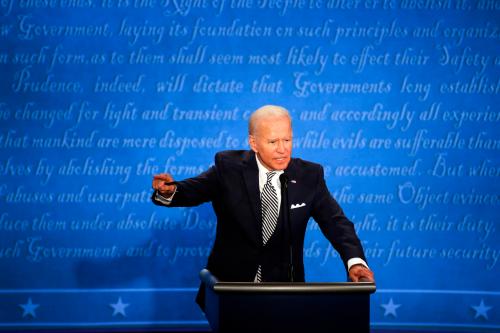
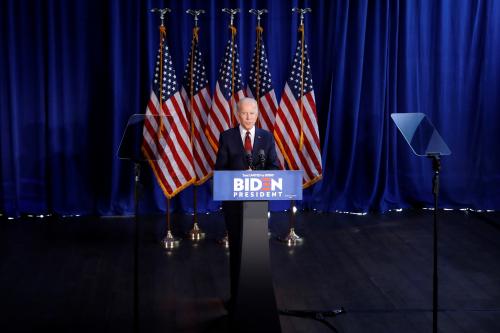
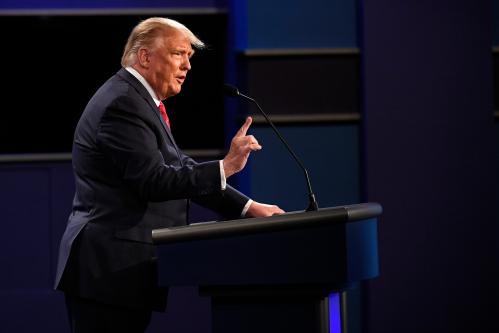

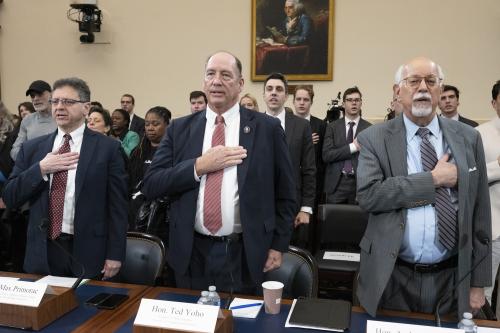
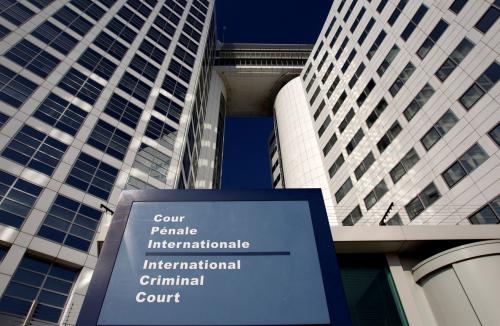
Commentary
The US must now repair democracy at home and abroad
January 11, 2021